Nov 2016
RIP Grant Tinker: Jan. 11, 1926 to Nov. 28, 2016
11/30/16 03:49 PM
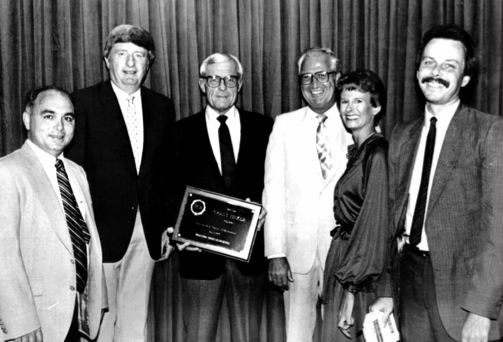
By ED BARK
@unclebarkycom on Twitter
Grant Tinker, the self-deprecating visionary who founded a legendary TV studio, resurrected a comatose network and received the Television Critics Association’s first Career Achievement award, has died at age 90 in his home. Lamentably a bygone relic to most younger viewers, his death wasn’t even made public until two days after the fact.
Tinker’s MTM Enterprises, which he formed in 1969 with his then wife, Mary Tyler Moore, birthed some of television’s most esteemed series, including The Mary Tyler Moore Show, The Bob Newhart Show, WKRP in Cincinnati, Lou Grant, The White Shadow, Remington Steele, Hill Street Blues and St. Elsewhere. The latter three series became key parts of NBC’s prime-time lineup of the early- to mid-1980s. Tinker took over as chairman and CEO in 1981 shortly after his divorce to Moore.
The Peacock’s fortunes had hit rock bottom under previous programming head Fred Silverman, with a menu that included eyesores BJ and the Bear, Sheriff Lobo, Games People Play, Speak Up America and a knuckle-dragging series version of the club-swinging hit movie, Walking Tall.
Tinker slowly but surely brought NBC back on the backs of high-quality series such as Hill Street, St. Elsewhere, Remington Steele and, most importantly, a Thursday night blockbuster comedy lineup of The Cosby Show, Family Ties, Cheers and Night Court. By the time of the 1985-’86 TV season, his last at the helm, NBC had won the prime-time ratings for the first time since 1970-’71.
During an April 1986 stop in Dallas, where he accepted the Distinguished Service Award at the National Association of Broadcasters convention, Tinker was winding down and readying his departure from NBC after the network’s RCA-General Electric merger became official. He nonetheless agreed to an extensive interview with this reporter, both downplaying his achievements and taking satisfaction in them.
“There were people who were doing a lot of doomsaying about NBC,” he recalled, “talking about a world with only two networks. So in that period of time we’ve done a great deal. We’ve restored the company. We now have a preeminence that is hugely satisfying. But I didn’t do it. I can honestly look anybody right in the eye and say I’m just one of many.”
One of his top lieutenants at the time, public information head M.S. “Bud” Rukeyser, had quit NBC in frustration during the Silverman years before Tinker wooed him back. He immediately savored the difference between the two regimes.
“We had total turmoil under the predecessor,” Rukeyser said. “There was a churning of people, churning of programs, total instability and people spending much of their working day worrying about their jobs and survival and so on. The day that Grant came in, the great calming influence was there. People were able to sit at their desks all day and do their jobs. It sounds kind of simple, but that was a big change from what had happened before.”
Tinker, Connecticut-born and California-cooled during his 11 years as head of MTM, had a laid-back vibe in times when those terms were operative. He didn’t like dressing up and more or less dreaded spending Mondays through Thursdays in New York as part of his chairmanship. He both believed in the power of quality programming and the effectiveness of keeping his hands off once a show was up and running.
Hill Street Blues co-creator Steven Bochco noted that Tinker “doesn’t try to change you. He doesn’t destroy the thing in you that attracted him in the first place.”
“I guess it is a strength,” Tinker said. “But I don’t know why it should be so unusual. Delegating is really nothing more than letting people help you. It’s a kind of aspect of laziness almost. It’s selfish as opposed to altruistic behavior, so I wonder why everybody doesn’t do it. It doesn’t seem like such black magic to me.”
He admittedly wavered at times on the quality front during his earlier years at NBC, particularly when low-brow series such as The A-Team and Knight Rider caught on quickly while Hill Street Blues, Family Ties and Cheers continued to struggle.
“Some of the more literate shows have a hard time these days,” he told TV critics in June 1984 as NBC prepared to do battle in another TV season. “If you don’t turn over those cars, I think they do go across the street and look at the other guy’s shows where that is happening. We have to be in that ballgame or go out of business . . . It is true that I have sort of modified my own opinion about how we should schedule NBC. Before I used to sing that MTM quality song perhaps a little too loud.”
But hallelujah, then along came The Cosby Show, an instant hit and faith-healer that likewise made big hits of the two Thursday night comedies in its wake, Family Ties and Cheers.
By the time of our April 1986 interview, Tinker had been made whole again.
“I’ve always felt there’s no reason people shouldn’t have good television as opposed to not-so-good,” he said. “But there was a period when I got a little discouraged. We put a few things on that didn’t work, and I began to fret about the audience. I tried to blame them as opposed to ourselves. But then when things began to work again, my faith in the audience was restored and it remains today . . . Leave good television on and the audiences usually will come around to find it. Not only is it satisfying as a result, but it is selfishly and commercially the better way to go. It’s less expensive. I’m always a little surprised that people see it as such an unusual way for a network to behave. It strikes me as the only way to behave.”
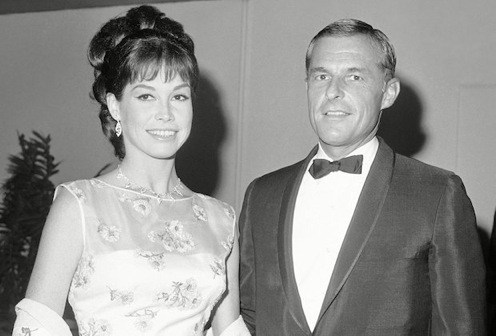
Tinker’s preference for TV’s high ground didn’t stop him from defending, sort of, his involvement in 1965’s My Mother the Car, which he helped to nurture during an earlier six-year stint as one of NBC’s programming vice presidents.
“People use that as the bottom, the absolute lowest television show ever,” Tinker said. “I don’t. I still think My Mother the Car was a funny idea that might have worked.”
Funny how things can work out, though. My Mother the Car’s creator, Allan Burns, went on to collaborate with Tinker on The Mary Tyler Moore Show.
He also wasn’t above throwing a few jabs. When CBS carped that NBC would have remained an also-ran without The Cosby Show factor, Tinker retorted, “If you took 60 Minutes and Sunday Night away from CBS, they would be floating on a raft in the Atlantic somewhere.”
Tinker also was no fan of paying mega-salaries to TV series stars after their shows took off in the ratings. When Dallas star Larry Hagman held out for a giant pay increase during the height of the show’s “Who Shot J.R.?” frenzy, Tinker told TV critics in 1980, “Maybe he shouldn’t recover. Whatever CBS is paying Larry Hagman, you could kill a disease with it. When somebody goes bananas (on an MTM-produced show), we tend to excuse them . . . I think it would have been a celebrated opportunity to show that the inmates don’t run the asylum.”
Tinker didn’t intend to go quietly into the night after leaving in 1986 as NBC chairman at the age of 60. But it kind of worked out that way. His new GTG Entertainment, bankrolled by the Gannett company, birthed several flops in the early going, most notably the syndicated USA Today: The Television Show. A trio of prime-time series for CBS, Raising Miranda, The Van Dyke Show and TV 101, were all quickly canceled, with only the latter show receiving decent reviews from TV critics.
“I’m just another shlepper now,” Tinker said when yours truly waylaid him en route to a Los Angeles hotel parking lot back in January 1989. He was at the hotel to tape a 40th birthday message for then NBC entertainment president Brandon Tartikoff, who had joined with Tinker in taking NBC back to the top. The “shlepper” bled with class, of course, when asked about his post-Peacock tribulations.
“I think it’s a good lesson in how quickly you can come down from being up,” he said. “But I had so much more than my share of good press at MTM and then at NBC. What is there new to write about me except failure? So when people see a little bit of that, it makes good copy. That’s OK. I’m old enough so that it’s not going to kill me.”
He did, however, have a little show called Baywatch on the drawing board for a possible spot on the NBC schedule. And although it will never be confused with high-caliber television, it did bring Tinker the glow of one last hit before GTG shut down.
He was little seen in the last two decades, at least not at public functions. But Tinker did show up at one more TCA awards ceremony years after he flew in on short notice from a programming conference in Maryland to accept that inaugural career achievement award in June 1985. Tinker was the only one invited to that first “ceremony” at the Century Plaza Hotel in Los Angeles. The TCA, then a seven-year-old organization, didn’t want to put on a big show for fear it might become an embarrassing spectacle. So the other winners were simply announced during the course of a bare-bones 20-minute ceremony.
“God, this is really embarrassing,” Tinker said, referring not to the award itself but on the decision to give it to him. “I think that you and I are more frequently on the same wavelength than we are not.”
It was quite a wavelength -- and no one rode it better than Grant Tinker.
Email comments or questions to: unclebarky@verizon.net
More future shocks in Syfy's solidly executed Incorporated
11/29/16 01:07 PM
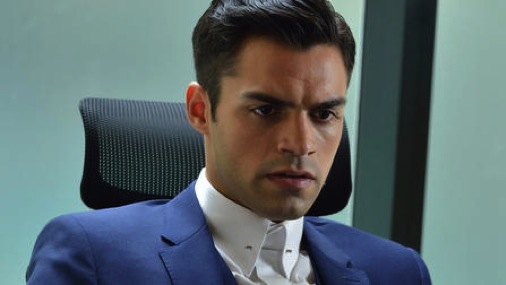
Premiering: Wednesday, Nov. 30th at 9 p.m. (central) on Syfy
Starring: Sean Teale, Julia Ormond, Dennis Haysbert, Allison Miller, Eddie Ramos, Denys Tontz
Produced by: Matt Damon, Ben Affleck, Jennifer Todd, Ted Humphrey
By ED BARK
@unclebarkycom on Twitter
Our imminent real-life futures may be problematic enough after a certain power shift takes hold early next year. But time will tell.
It’s long been clear, though, that little good can come from the more distant fictional futures depicted on television or the big-screen. Dystopia is 100 percent guaranteed, whether it’s:
A. An Earth taken over by colonizing extraterrestrials who view humans as inferior germs.
B. An Earth ravaged by other wars or environmental disasters caused by humankind.
C. An Earth run by sinister, multi-national corporations bent on enriching themselves while impoverishing the masses.
The Syfy network’s Incorporated goes with option C in the not-so-great year of 2074. Its principal executive producers, Matt Damon and Ben Affleck, don’t do any cameos in the five episodes made available for review. But they do invest this sobering drama series with impressive production values and an array of eye-catching innovations if you happen to be among the privileged few living in a Green Zone. The lumpens otherwise are left to claw, scrape and scrap in seriously deprived Red Zones.
Our featured multinationals are the “bio-technical giant” SPIGA and its arch rival, the INAZAGI Corporate Army. But SPIGA gets most of the play, with venerable Julia Ormond doing whatever it takes as an amoral CEO named Elisabeth Krauss.
Krauss’ daughter, Laura (Allison Miller), who of course doesn’t like her, is married to up and coming junior executive Ben Larsen (Sean Teale). Unbeknownst to both women, Ben’s real name is Aaron. And he’s a former member of the rabble class who’s bent on finding and freeing his first and enduring love, Elena Marquez (Denys Tontz). Alas, she’s been sold into the “sex slave” trade, which services upper-crusters. Elena also has a chafing brother named Theo (Eddie Ramos), who becomes a tool himself as part of a brutal cage match industry operating in the Red Zone. One of its main venues is a club called the Meat Grinder.
Veteran actor/pitchman Dennis Haysbert climbs aboard as Julian, who heads up Elisabeth’s security unit and when necessary, terrorizes suspected traitors in “The Quiet Room.” Haysbert drops in and out more than the other featured players, but does have a nice one-on-one scene with Miller’s Laura in an eventful and revealing Episode 5.
Incorporated makes fairly heavy use of flashbacks throughout these initial five hours, but never confusingly so. There’s nothing exceptional about the acting or characterizations. But the intersecting storylines carry their weight and the various gizmos on display are both imaginative and suitably futuristic. This is a world where spray-on medications make lacerations vanish while babies can be genetically hand-crafted before “gestators” do the heavy lifting. But only if you have the money.
Episode 3 so far has the most inventive beginning. Kids are shown watching a propaganda cartoon in which Officer Bucky urges a little girl to snitch on her mom if she ever says anything bad about a ruling multi-national. The kids then chant, “If you hear something yucky, tell Officer Bucky.”
Reviewers such as your friendly content provider also heard multiple, fully elucidated f-bombs during these episodes. A Syfy publicist clarified matters, saying they’ll be “audio dropped” from the on-air versions. But a villainous character will still be allowed to say in Episode 3: “If I wanted to listen to an old hag talk dirty, I’d give my mom a call.” Don’t worry. She gives him his comeuppance -- and then some.
Although its super-bleak future is nothing new, Incorporated does an above-average job of bringing it all home. And by the time all of this is over, perhaps the price of bacon can be brought down just a little bit. A pound or so costs $600 at “present.” Let them eat cake.
GRADE: B-minus
Email comments or questions to: unclebarky@verizon.net
Fusion's The Traffickers could also be a starmaker
11/18/16 10:55 AM

”Host” Nelufar Hedayat both reports and emotes in The Traffickers. Fusion photo
Premiering: Airs on Sundays at 9 p.m. (central) on Fusion
Hosted by: Nelufar Hedayat
Produced by: Simon Chinn, Jonathan Chinn, Isaac Lee, Daniel Eilemberg, Keith Summa, Sam Collyns
By ED BARK
@unclebarkycom on Twitter
It’s a pretty safe bet that nine of 10 Americans either have never heard of the Fusion network or have no idea where to find it on their sprawling cable or satellite menus.
So before getting to The Traffickers, here’s a brief primer.
Fusion, owned by Univision Communications, was launched in October 2013 as a replacement for the failed ABC News Now. Its target audience is English-speaking millennials, and the programming mix has ranged from The Cannabusiness Report to My Selfie Life. There’s also a Fusion version of Nightline, although it’s hard to tell the difference these days.
The Traffickers, which premiered with back-to-back hours on Sunday, Nov. 13th, is meant to be far more serious-minded than any of the above. The eight-part series is billed as a “global journey inside the hidden world of trafficking,” whether it’s babies, vital organs, guns or precious metals.
Episode 3, airing on Sunday, Nov. 20th, plunges intrepid 28-year-old “host” Nelufar Hedayat into the international world of illegal kidney peddling. Hedayat, who previously worked for the BBC and also writes about the fashion and beauty industry for GlamMonitor.com, is an Afghanistan refugee who arrived in the United Kingdom at the age of six. She is very much front and center in The Traffickers, which can still be off-putting to those who prefer a more “traditional” form of journalism.
One can admire Hedayat’s passion while also wishing she’d reign herself in and stop with the posing and occasional histrionics. She’s serious about pursuing the truth, and certainly is no airhead. Still, in Episode 1, it’s more than a bit much to see her teary-eyed at one point and steeling herself at another. “I’m going to track down these child-finders and see how they do it,” she vows after journeying from Colorado to the Congo. Hedayat certainly puts in the legwork while also usually teaming up with a “fixer” (journalist) on the scene. The production values are impressive throughout.
One of the series’ better exchanges comes in this Sunday’s “Organs for Sale” episode. Hedayat meets with a 63-year-old thrill seeker whose lifestyle was greatly compromised when his kidneys shut own. The man’s sister donated one of hers, but it eventually failed him at age 58. So he bought another one in Pakistan from a dirt-poor farmer who was paid $3,000. That’s a bargain, but for the desperate farmer it supposedly was a financial windfall. When Hedayat questions whether he exploited the donor, the recipient replies with some agitation, “You want to force people to be altruistic. Good luck.”
Journeying to Bangladesh to see the illicit kidney trade up close and personal, Hedayat and a resident journalist finally get a donor to talk to them. “Can I see your scar? Oh my Holiness!” Hedayat gasps when a man shows her the end result of being paid $6,000 for one of his two kidneys. He’s since been shunned by his neighbors because “selling body parts goes against their Islamic faith.”
But “for the wealthy,” Hedayat tells viewers, “these people are vessels. They’re containers.”
Some of this is eye-opening, even heartbreaking. And Hedayat is not one to hide her emotions. Dispassionate reporting isn’t her thing, and Fusion clearly believes that most millennials feel the same way about how they want the news delivered to them.
The Traffickers is in league with HBO’s Vice in terms of its hands-on, emotionally charged approach. Hedayat doesn’t just report. She feels the pain, the anguish, sometimes even the joy. And her declarations can be unequivocal: “This is black and white. This is clear. This is wrong.” She also lets it be known that “I feel kind of crushed by the weight of what she’s saying.”
Hedayat clearly has the ability, the drive, the looks and yes, the acting ability, to someday be an ABC News reporter or host. Among the Big Four broadcast networks, ABC above all prizes “star quality” journalists who wear their empathy and/or outrage on their sleeves. The Traffickers might someday be remembered as the series that put this still budding talent on radar screens -- even if not on many home screens. Fusion remains barely a blip in the grand TV scheme of things. But if the “right” people are watching . . .
GRADE: C+
Email comments or questions to: unclebarky@verizon.net
A "Lady Mary" quite contrary in TNT's Good Behavior
11/15/16 10:27 AM
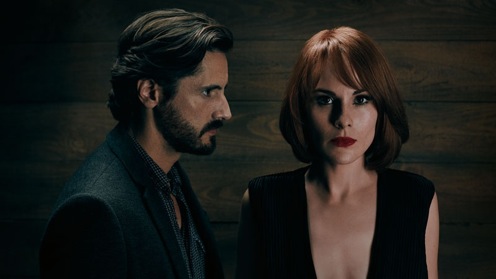
Juan Diego Botto and Michelle Dockery break bad in Good Behavior. TNT photo
Premiering: Tuesday, Nov. 15th at 8 p.m. (central) on TNT
Starring: Michelle Dockery, Juan Diego Botto, Lusia Strus, Terry Kinney
Produced by: Chad Hodge, Blake Crouch, Marty Adelstein, Becky Clements
By ED BARK
@unclebarkycom on Twitter
Tightly bound in proper Downton Abbey finery for six seasons, Michelle Dockery lets loose with a vengeance in TNT’s determinedly “adult” Good Behavior.
The transition is beyond stark in her first American TV series. Dockery U-turns from adventuresome but etiquette-respecting Lady Mary Crawley to drug-hazed, flesh-baring ex-con Letty Dobesh, whose compulsive thievery is also part of her makeup. Smoking crack from a jerry-rigged light bulb leaves her very much worse for wear at the end of Tuesday’s premise-setting premiere episode.
“You need to replenish your system,” she’s told near the start of Episode 2.
“I need to smoke a bowl,” Letty shoots back. Lady Mary begone.
Adapted from the book by Blake Crouch, who’s also an executive producer, Good Behavior plays an uneven game of cat and mouse throughout the first three hours made available for review. Its two principal stars, with Argentinian Juan Diego Botto as a suave, hunky hit man named Javier, are both visually glorious and increasingly intriguing as thrown-together partners in crime.
His misdeeds are a big step up from hers, though. As a murderer for hire, Javier calmly goes about his business while Letty both succumbs to his charms and begs to be freed after essentially being kidnapped. Some of this can be a little far-fetched, with Letty also being pestered by a parole officer named Christian (Terry Kinney). Beset with his own set of problems, Christian is prone to cut her some slack while repeatedly insisting that she report to him as scheduled or be sent back to prison. Does he really mean it, though? Good Behavior strains to accommodate this supporting storyline while also mixing in Letty’s cold-hearted mother, Estelle (Lusia Strus), who won’t let her daughter see a pre-teen son from a previous marriage.
Through it all, TNT flexes its latter day “edgy” muscles with f-bombs that have their midsections muffled, some rather provocative sex talk and Dockery in various stages of undress that wouldn’t have made the cut in Rizzoli & Isles. This includes a notably definition-enhancing nightgown in Episode 1.
So how does it all come to this? Recently released early from prison for “good behavior,” Letty is first seen slogging out a living at a diner before a slug of a customer comes on to her in the restroom. She punches him and lifts his wallet before being fired by a boss who brays, “You junky whore. You belong in prison.”
Letty then returns to robbing luxury hotel suites while their inhabitants are elsewhere. Unfortunately, she ends up hiding in a closet and overhearing Javier’s plans to bump off the wife of his latest paying customer. Will Letty try to save the day? Yes. Will complications ensue? You bet. “You work for me now,” she’s told. And Javier is not kidding in the least.
Episode 2 revolves around Letty masquerading as Javier’s wife while he arranges to knock off a boorish husband whose long-suffering wife has joined him at a posh resort. This gives Dockery a chance to belt out a few bars of “Blue Skies” during the course of sloshing down martinis with the unsuspecting spouse while Javier joins her hubby for a little game of golf -- and an end game. But there are complications. And eventually an extended road trip in Episode 3, which includes some sharp banter and a few fairly inventive twists.
Dockery fully inhabits this role, to the point where Letty kicks in and the “Hey, that’s Lady Mary” thoughts tune out. Botta hangs in and pretty much measures up, giving Good Behavior two to grow on as the series progresses. Whether he’s a hit man with a heart still hangs in the balance, as does Letty’s overall willingness to leave him when and if she can.
Good Behavior so far is a work in progress with two leads who show considerable promise in terms of making it all work. Dockery’s rather amazing transformation is the principal selling point -- for now.
GRADE: B
Email comments or questions to: unclebarky@verizon.net
The Crown is another jewel for Netflix
11/02/16 08:38 AM
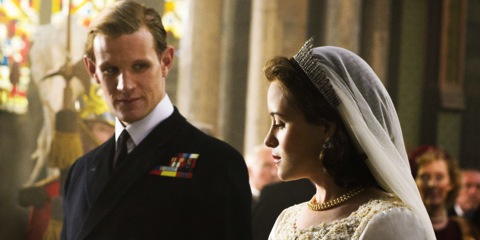
Premiering: Streaming all 10 Season 1 episodes Friday, Nov. 4th on Netflix
Starring: Claire Foy, Matt Smith, Vanessa Kirby, Jared Harris, John Lithgow, Victoria Hamilton, Jeremy Northam, Alex Jennings, Eileen Atkins, Ben Miles, Harriet Walter, Pip Torrens, Harry Madden-Paton, Joseph Kloska, Stephen Dillane, Greg Wise
Produced by: Peter Morgan, Stephen Daldry, Suzanne Mackie, Robert Fox, Andy Harries, Philip Martin, Matthew Byam Shaw, Tanya Seghatchian
By ED BARK
@unclebarkycom on Twitter
“Humanizing” upper-crust Britishers, let alone The Royals, remains a considerable challenge in any day or age.
After all, what are they but absurdly rich, pampered and proper? Good Gawd, they even dress for dinner.
Still, the appetite among commoners of a certain age seemingly is insatiable. Downton Abbey became a bounteous feast during its six highly successful seasons on PBS. The downstairs rabble faithfully served their upstairs masters and mistresses, who proved to be “relatable” if recurrently condescending. Their fictional loves, marriages and mishaps superceded the basic pomposity of it all. British blue bloods bleed just like the rest of us.
Netflix’s The Crown, for which six seasons are planned, if anything is even more accomplished in chronicling the real-life trials and travails of its royal subjects. At center court is Queen Elizabeth II (Claire Foy), whose reign has endured well beyond the ages of most current-day earthlings. One must be at least 63 to have lived from the outset of her official 1953 coronation. She’s 90 now, and presumably has no interest in watching herself being dramatized as the relative child bride of the now 95-year-old Philip, Duke of Edinburgh (Matt Smith). She married him in 1947 against the wishes of her parents, King George VI and Queen Elizabeth (Jared Harris, Victoria Hamilton), who initially looked down upon him as a common bloke.
The first of Season One’s 10 episodes, all available for streaming on Friday, Nov. 4th, begins with King George coughing up a bloody storm on the wedding day of his oldest of two daughters. He’s in the not so early stages of lung cancer, but still very much puffing away. So no, he’s not very long for this world. But in the first two episodes, the second of which is simply magnificent, Harris registers fully as a kingly father who dearly loves both Elizabeth and her far more coltish sister, Margaret (Vanessa Kirby).
“She is the essence of your duty -- loving her, protecting her,” the king tells Philip shortly after he’s married Elizabeth. It’s deemed the ultimate act of patriotism.
Netflix made the entire first season available for review, and its high points are too numerous to detail. Peter Morgan (The Queen, The Audience) is the creator and writer of all 10 episodes, with Stephen Daldry (Billy Elliot, The Hours) serving as principal director. It’s a combination that merits its own coronation throughout a sumptuous undertaking that reportedly has a price tag of more than $100 million for Season One alone. Portraying The Royals has never come cheap.
Season One spans from 1947 to 1954, although there are flashbacks to earlier formative times. This proved to be a mere speck of Elizabeth II’s reign, but it’s time enough to see the hardening process. As queen, Elizabeth II is regularly told that being Her Majesty means never having to say you’ve compromised the “way things are done.” By Episode 9, she’s telling the freewheeling Margaret, “You showed individuality. And that made people panic. They don’t want individuality.”
Reinforcing this dictum time and again are Prime Minister Winston Churchill (John Lithgow), Grandma Queen Mary (Eileen Atkins) and principal aide Tommy Lascelles (Pip Torrens), the veteran, hidebound Snidely Whiplash in residence. He’s very, very boo-able.
Lithgow’s Churchill is vainglorious to be sure, but also touching in both his devotion to wife Clemmie (Harriet Walter) and his penchant for painting. He pretty much owns Episode 9, in which Churchill’s 80th birthday is cause for both an official portrait and parliamentary recognition. It’s a rousing and heart-tugging hour tinged with both denial and resignation. And Lithgow is superb throughout it.
Kirby’s performance as Margaret is likewise an eye-catcher. The self-proclaimed daddy’s “favorite” falls madly and very improperly in love with the divorced Peter Townsend (Ben Miles), a war hero who went on to be one of her father’s key confidantes. The restrictions placed on their relationship drive a wedge between Margaret and Elizabeth, with the queen resentful of both the predicament she’s been put in and the limelight that’s being stolen by her appreciably more colorful sister.
Philip likewise chafes at his wife’s growing devotion to her royal duties. He increasingly opts for nights on the town with his chums while Elizabeth bristles and eventually even throws a few things at him other than remonstrances.
Also memorable is David, Duke of Windsor (Alex Jennings), who abdicated as King and left the throne to his brother after falling in love with the multi-divorced Wallis “Peaches” Simpson (Lia Williams). He’s since been scorned, with his wife unwelcome at any and all royal gatherings, even the deaths of his father and mother. Jennings has some delectable lines in letters back home to Wallis, including “What a bunch of ice-veined monsters my family are.” David can be a bit of an ass himself, but The Crown is mostly on his side as a man who chose love over pomp, ceremony and privilege.
Episode 4 is mostly built around “The Great Smog” of 1952, which lasted from Dec. 5-9 of that year and plunged London into darkness and deaths from the sulfur dioxide polluting the air. Churchill again stirs the pot, cannily fortifying his shaky foundation as prime minister in ways that are both duplicitous and ingenious.
Although the queen grows increasingly unbending, she is not without her reasons. Nor is she entirely unsympathetic as a dutiful daughter who strives to work things out before invariably giving in. The Crown also makes it clear that Elizabeth quickly becomes rather taken with the ornate trappings and adoring subjects during trips abroad to the Crown’s “dominions.”
“You can’t bare to be eclipsed . . . You reap what you sow, sister,” Margaret angrily tells her in Episode 6 after again feeling deeply betrayed.
Philip is along for the ride at first, doggedly walking the proscribed several steps behind his wife and very reluctantly kneeling before her at her coronation. He also insists on spreading his wings by getting his wings as a pilot faster than anyone in aviation history.
“What am I supposed to do -- sit around and wait for you while you’re ‘queening?’ “ he asks. At first Elizabeth is somewhat bemused. Later, not so much. Nor is she ever seen playing with the couple’s two children, Charles and Anne. That’s left up to Philip, and he does so joyously while also fretting that Charles is a bit too much of a “girl.”
It’s all quite enthralling and majestic, with Netflix again stepping up and unveiling an intendedly long-running drama series that’s likely to be rich in Emmy nominations next summer. Foy’s performance is sturdy, as it must be, as Elizabeth II. Lithgow, Kirby and Jennings get recurring chances to figuratively somersault in their appreciably more colorful roles as Churchill, Margaret and the Duke of Windsor.
As The Crown goes on, though, its throne-bearer will be challenged to portray the Queen in ways that offset her further congealing. Elizabeth II will never be the life of the party. But she’s the overriding reason for doing this in the first place. Long live the Queen --but not to the point of being deathly boring -- in a so far richly satisfying story that’s barely just begun.
GRADE: A
Email comments or questions to: unclebarky@verizon.net
